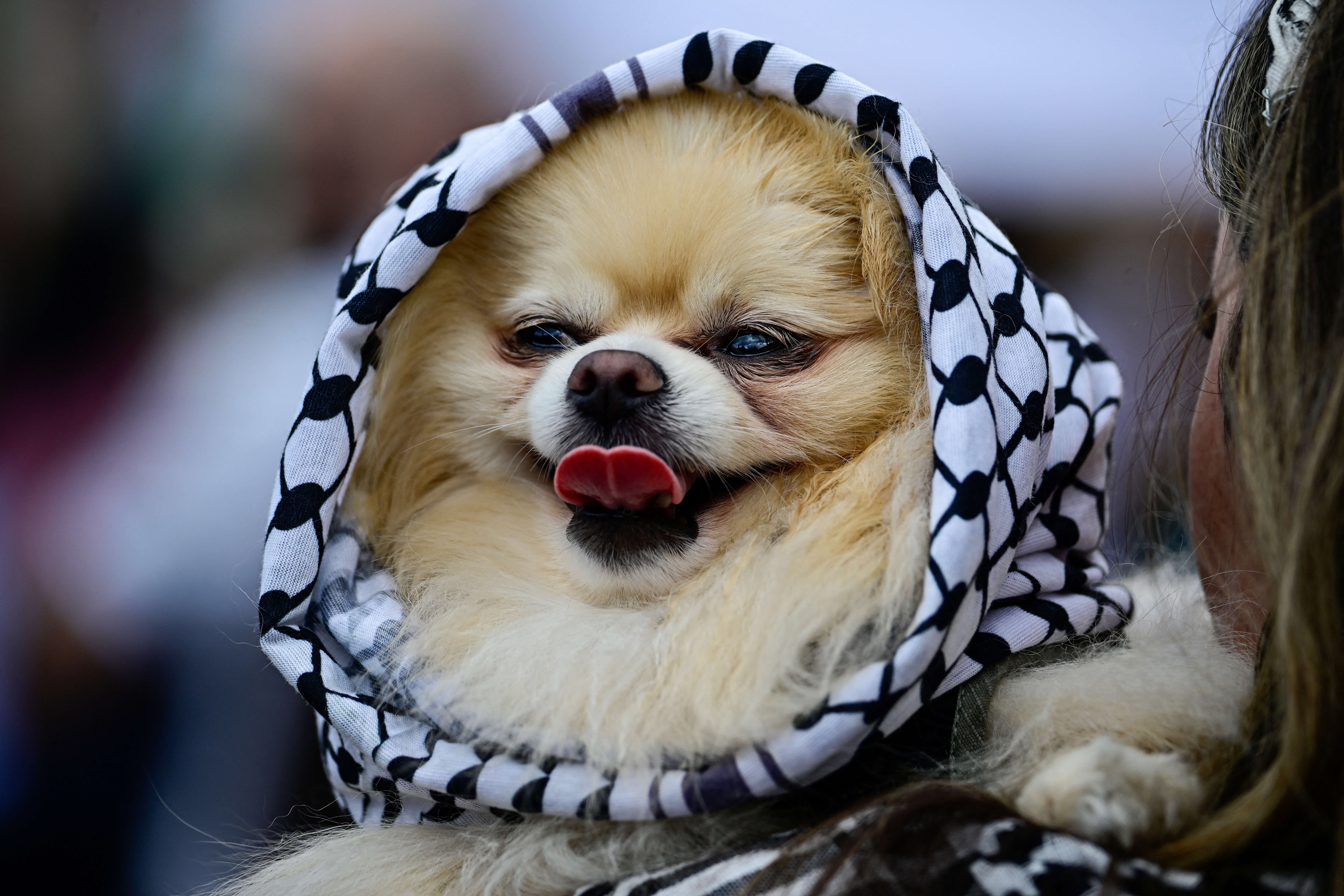What happens when pro-Palestinian symbols become fast fashion?
Kaffiyeh-print everything is now available, drop-shipped to your door for low, low prices

Kaffiyeh-print dog accessories are also available. Courtesy of Getty Images
It’s hard to deny the fact that the pro-Palestinian movement is, at this point, cool — at least in certain social circles.
Sure, there’s the pressure to say the right things on college campuses or repost things on social media. But the ubiquity of “Free Palestine” merchandise really makes it clear that the movement is, well, fashionable.
Kaffiyehs, a traditional Arab woven scarf, have had fashion moments before, perhaps most notably during the Scarf Era of the 2010s, when scarves writ large were an inescapable accessory. But back then, people seemed to just think of the kaffiyeh as looking really hipster; Urban Outfitters sold them, though they, at one point, labeled them “houndstooth” scarves. They were so entirely divorced from the Palestinian cause that cooking personality Rachael Ray wore one in a Dunkin’ Donuts ad. (Dunkin’ Donuts denied that it was a kaffiyeh, but pulled the ad anyway.)
Now, the politics are the fashion. Walking around New York City, you can see kaffiyehs tied into mini skirts, used as bandanas and fashioned into crop tops. On TikTok, there are tutorials for tying your kaffiyeh into an evening bag or a shirt.
@jeneenmaciel catch me rotating diff variations all summer 🫶🏼
♬ deira saint levant - ᶜ ʰ ˡ ˡ ˣ ᵉ ᵈ ⁱ ᵗ ˢ
And that’s just items fashioned out of the actual scarf. The kaffiyeh theme has expanded to the point that, online, you can buy kaffiyeh press-on acrylic nails, kaffiyeh scrunchies and kaffiyeh iced-coffee tumblers. The copy on a kaffiyeh-print bandana described the product as “advocating for a free Palestine through every knot and fold,” even though the item is screen-printed, not woven.
Of course, it’s not just kaffiyehs that are fashionable; it’s anything vaguely Palestinian. A site that purports to help “diaspora kids rep their culture” sells college-style sweatshirts emblazoned with “Palestine University” and “University of Palestine,” though neither institution exists. Others look like vintage band tees, printed with a faded poster design for the “Palestine Valley Music Festival” in 1971, which didn’t occur then or any other year.
Other shops incorporate ironic tee slogans like “Introverted, but willing to discuss how America is funding a genocide” or have gone artsy with it, delicate florals looping around the words “Free Palestine.”
Much of the merchandise is sold, at least nominally, as part of fundraisers, with artists and manufacturers donating a percentage of sales to aid in Gaza — Wear the Peace, a clothing company dedicated to raising money for humanitarian missions, says it is donating 100% of the sales from its “Free Palestine” and watermelon-themed merch, for example. And many of the creators on Etsy say they are either Palestinian themselves — in which case consumers can feel good about supporting Palestinian artists — or are donating some percentage of profits to an NGO in Gaza.
But many others are simply capitalizing on a trend.
Drop-shippers, a form of cheap e-commerce where online shops advertise what often appear to be artisanal goods that are actually mass manufactured and shipped straight to the consumer, are known for their ability to pivot quickly to new trends. And now they’re shipping kaffiyeh and “Free Palestine” merch straight from China to people’s doors.
One online shop that appeared to previously sell largely mass-produced fleece pajamas, for example, now sells 16 different pro-Palestinian T-shirt designs, but there is nothing on the site indicating support, whether financial or emotional, for the cause. And of course Shein, the ultra-fast fashion behemoth, is selling kaffiyeh products in all colors and shapes.
Even the store selling “Palestine University” sweatshirts doesn’t pretend to donate anything, despite their slick site full of social justice buzzwords about supporting minorities. (Their Instagram page is also full of angry comments from customers complaining that they’ve never received their order.)
There is, of course, a long tradition of wearing political-slogan T-shirts. And regardless of who is actually profiting off of the trend, perhaps now that everyone seems to know what kaffiyehs symbolize, their ubiquity has some sort of political impact — after all, when everyone around you seems to support a cause, it usually feels like you should too.
But there’s also a clear irony in fast-fashion political merch; companies like Shein rely on near slave-labor to quickly produce cheap and disposable clothing that influencers on TikTok can show off in “haul” videos where they display dozens of items in the span of a minute or two. The low barrier of entry just makes the political statement itself feel as cheap and disposable as the clothing.
This isn’t to say that fashion can’t be political; it can, and often is, a powerful way to make a statement. Using a $10 kaffiyeh tumbler to boost views on an aesthetic iced latte video, however, is a different story.
























